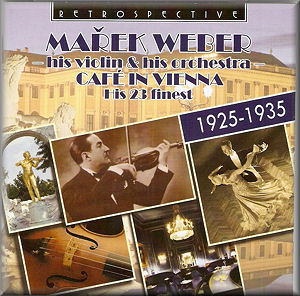 CD Reviews
CD Reviews MusicWeb
Webmaster: Len Mullenger
Len@musicweb.uk.net
[Jazz index][Purchase CDs][ Film MusicWeb][Classical MusicWeb][Gerard Hoffnung][MusicWeb Site Map]

Marek Weber, his violin and his orchestra; Café in Vienna. His
23 finest 1925-1935
Marek Weber and his orchestra
rec. 1925 to 1935
![]() RETROSPECTIVE RTR 4196 [79:06]
RETROSPECTIVE RTR 4196 [79:06]
Buy
through MusicWeb
for £7.00 postage paid World-wide.
1 Café In Vienna (With John Hendrik)
2 Valencia
3 Da Draussen In Der Wachau
4 Estudiantina
5 Schöner Gigolo (With Marcel Wittrisch)
6 Japanischer Laternentanz
7 Rosen Aus Dem Süden
8 Frühlingslust
9 Oh, Donna Clara (With Marcel Wittrisch)
10 Gold Und Silber
11 Die Blume Von Hawaii – Selections
(With The Comedian Harmonists)
12 Viennese Singing Birds
13 Spanish Gypsy Dance
14 I Want Nothing But Your Love
15 Rosa Mía (With Sam Costa)
16 Tonight Give Me An Hour Of Love
(With Sam Costa)
17 The Merry Widow – Waltz
18 Her First Dance
19 The Music Comes
20 Dream Of Love
21 Marie Louise (With John Hendrik)
22 Love’s Last Word Is Spoken, Chérie
23 Song Of Paradise
One of the eminent musical figures to have emerged from the province of Galicia was violinist Marek Weber (1888-1964). Classically trained and a youthful prodigy, he formed his first salon orchestra in 1908 and between 1914 and the early 1930s, when emigration proved a necessity, his was the resident band at the prestigious Hotel Adlon in Berlin. Waltzes and the like were the staple repertoire but as the dance craze swept Europe from America, his repertoire changed. He first recorded after the end of the First World War and throughout the next decade and a half turned out a stream of popular discs, often teaming up with well known radio stars and personalities, such as Marcel Wittrisch and the Comedian Harmonists (both represented in this selection of his discs). This particular selection ranges over a decade, starting in Berlin in 1925 and ending in London in February 1935.
It’s curious to think that Weber, who seems to have been so pompously anti-Jazz that he would storm off whenever his band played ‘hot’, would go so far as to employ the black American Arthur Briggs, a man who could play hot when he wanted to. There seems to be some sort of contradiction here, and I would be wary of endorsing ideas of any bandleaders’ antipathy to jazz when, firstly they (not the band) set the programme and second they employ a sometime jazz, or at least jazzy, player. Maybe Weber was just canny and knew where his dance bread was buttered.
He assuredly ran a tight and confident ship. The Spanish and Viennese dances are played with directness and assurance. He performs one number with the Original Viennese Schrammel Orchestra and we can gauge his very competent solo violin playing from this 1929 side. Wittrisch sings Schoner Gigolo in German and naturally there is a Lehár waltz or two (the obvious ones) to leaven the more obscure numbers. The rather unlikely Comedian Harmonists’ recording of Die Blume Von Hawaii may sound kitsch to us now, but it had some kind of novelty value then. And if Beatrice Harrison could play her cello to the nightingales, then Weber was going to bring Viennese Singing Birds to everyone’s attention in his 1931 Berlin recording. Weber kept au currant with paso doble recordings and when he came to London employed singers such as Sam Costa (a dance band vocalist in the main) to court local popularity, one assumes. John Hendrik also sings on the London songs, and his Tauber-lite vocalism is effective.
From London Weber went to America, but that’s another story. This one ends in mid-stream. This is an attractive disc of light music, well transferred and with helpful notes, played by one of the masters of the genre.
Jonathan Woolf